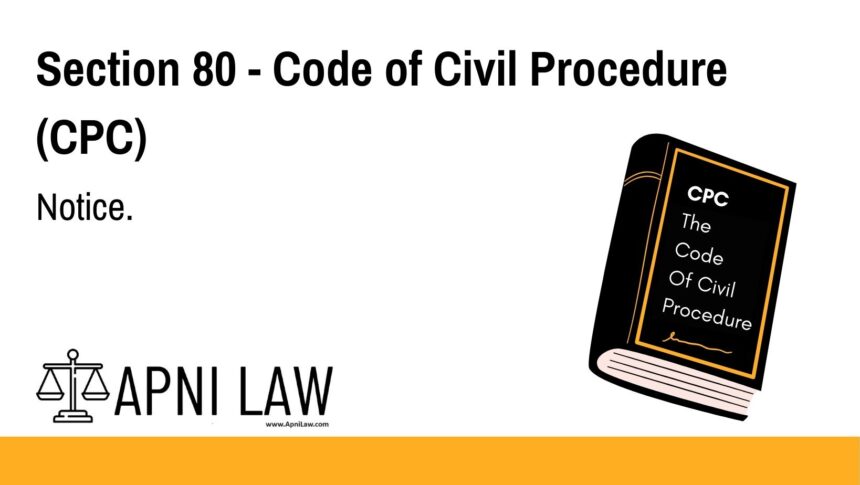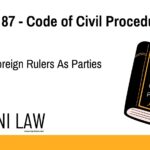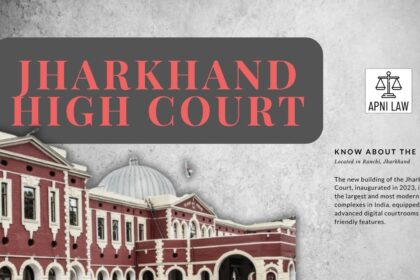Code
CPC1[(1)]2[ Save as otherwise provided in sub-section (2), no suits3[shall be instituted]
against the Government (including the Government of the State of Jammu and Kashmir)] or against a
public officer in respect of any act purporting to be done by such public officer in his official capacity,
until the expiration of two months next after notice in writing has been4[delivered to, or left at the office
of](a) in the case of a suit against the Central Government,5[except where it relates to a railway] a
Secretary to that Government;6[(b)] in the case of a suit against the Central Government where it relates to railway, the General
Manager of that railway;7[(bb) in the case of a suit against the Government of the State of Jammu and Kashmir, the Chief
Secretary to that Government or any other officer authorized by that Government in this behalf;](c) in the case of a suit against8[any other State Government], a Secretary to that Government or
the Collector of the district;9***10*****and, in the case of a public officer, delivered to him or left at his office, stating the cause of action, the name, description and place of residence of the plaintiff and the relief which he claims; and the
plaint shall contain a statement that such notice has been so delivered or left.11[(2) A suit to obtain an urgent or immediate relief against the Government (including the
Government of the State of Jammu and Kashmir) or any public officer in respect of any act purporting to
be done by such public officer in his official capacity, may be instituted, with the leave of the Court,
without serving any notice as required by sub-section (I); but the Court shall not grant relief in the suit,
whether interim or otherwise, except after giving to the Government or public officer, as the case may be ,
a reasonable opportunity of showing cause in respect of the relief prayed for in the suit:Provided that the Court shall, if it is satisfied, after hearing the parties, that no urgent or immediate
relief need be granted in the suit, return the plaint for presentation to it after complying with the
requirements of sub-section (1).(3) No suit instituted against the Government or against a public officer in respect of any act
purporting to be done by such public officer in his official capacity shall be dismissed merely by reason
of any error or defect in the notice referred to in sub-section (I), if in such notice(a) the name, description and the residence of the plaintiff had been so given as to enable the
appropriate authority or the public officer to identify the person serving the notice and such notice
had been delivered or left at the office of the appropriate authority specified in sub-section (1), and(b) the cause of action and the relief claimed by the plaintiff had been substantially indicated.]
Here’s a structured ApniLaw-style article for the CPC provision you shared, covering notice before suing the Government or public officers:
CPC – Section 80: Notice Before Suits Against Government or Public Officers
Code Text (Formatted)
Section 80 CPC – Notice before institution of suits
(1) Save as otherwise provided in sub-section (2), no suit shall be instituted against the Government (including the Government of Jammu and Kashmir) or against a public officer for acts done in his official capacity until two months after a written notice has been delivered to, or left at, the office of:
(a) In a suit against the Central Government (except for railway matters), a Secretary to that Government;
(b) In a suit against the Central Government relating to railway matters, the General Manager of that railway;
(bb) In a suit against the Government of Jammu and Kashmir, the Chief Secretary or an authorized officer;
(c) In a suit against any other State Government, a Secretary of the State or the Collector of the district.
The notice must state the cause of action, the name, description, and residence of the plaintiff, and the relief claimed. The plaint must include a statement that such notice has been delivered or left.
(2) A suit for urgent or immediate relief may be instituted without serving the notice, with leave of the Court, but the Court shall not grant relief except after giving the Government or public officer a reasonable opportunity to show cause.
(3) No suit shall be dismissed merely due to an error or defect in the notice if:
(a) The plaintiff’s identity can be determined, and the notice was delivered or left at the appropriate office; and
(b) The cause of action and relief claimed were substantially indicated.
Explanation
Section 80 CPC protects the Government and public officers from sudden litigation, ensuring they have reasonable time to respond.
- Purpose:
- Provides a two-month notice period before filing a suit.
- Gives the Government or officer time to settle or respond to claims, reducing unnecessary litigation.
- Scope:
- Applies to all Central and State Governments, including Jammu & Kashmir.
- Covers public officers acting in official capacity.
- Allows exceptions for urgent or immediate relief, with Court permission.
- Key Requirements:
- Notice must identify the plaintiff and describe cause of action.
- Must state the relief claimed.
- Notice delivery must be to the appropriate officer or authority.
- Defective Notice:
- Courts cannot dismiss the suit if the plaintiff can be identified and the cause of action and relief are clear.
Illustration
- Suing Central Government:
- A citizen claims damages for land acquired by the Central Government.
- Notice is served to the Secretary of the concerned Ministry.
- Two months later, the citizen can file the suit if unresolved.
- Urgent Relief Case:
- A factory is polluting a river causing immediate harm.
- Court may allow filing suit without notice for interim injunction, but the Government must be given a chance to respond.
- Minor Notice Error:
- A plaintiff accidentally mentions the wrong office, but the correct authority receives the notice and understands the claim.
- The Court will not dismiss the suit under Section 80(3).
Common Questions & Answers
Q1. What is the purpose of the two-month notice?
👉 To give the Government or officer reasonable time to settle disputes and avoid sudden litigation.
Q2. Can urgent matters bypass the notice requirement?
👉 Yes, with Court leave, but relief is granted only after hearing the Government or officer.
Q3. What if there is a minor error in the notice?
👉 The suit cannot be dismissed if the plaintiff’s identity, cause of action, and relief are substantially clear.
Q4. Who receives the notice in State Government cases?
👉 Either the State Secretary or the Collector of the district, depending on the nature of the suit.
⚖️ Conclusion:
Section 80 CPC ensures fairness and administrative efficiency by requiring prior notice before suing the Government or public officers. It balances the plaintiff’s right to sue with the Government’s need to respond, while allowing urgent relief in exceptional case








